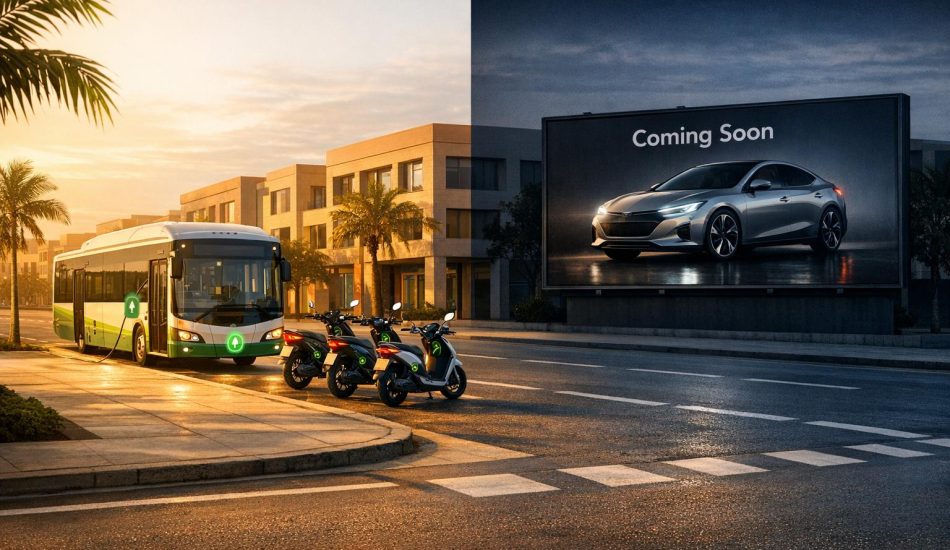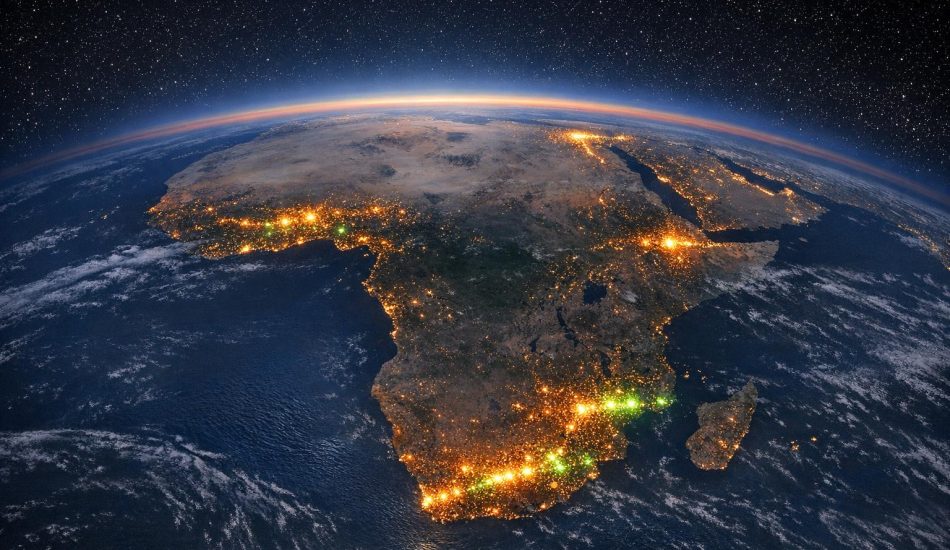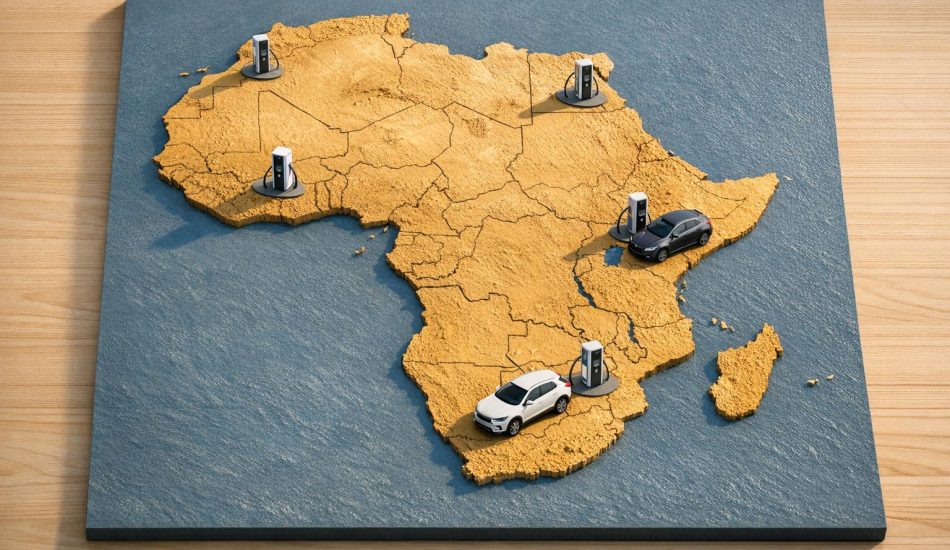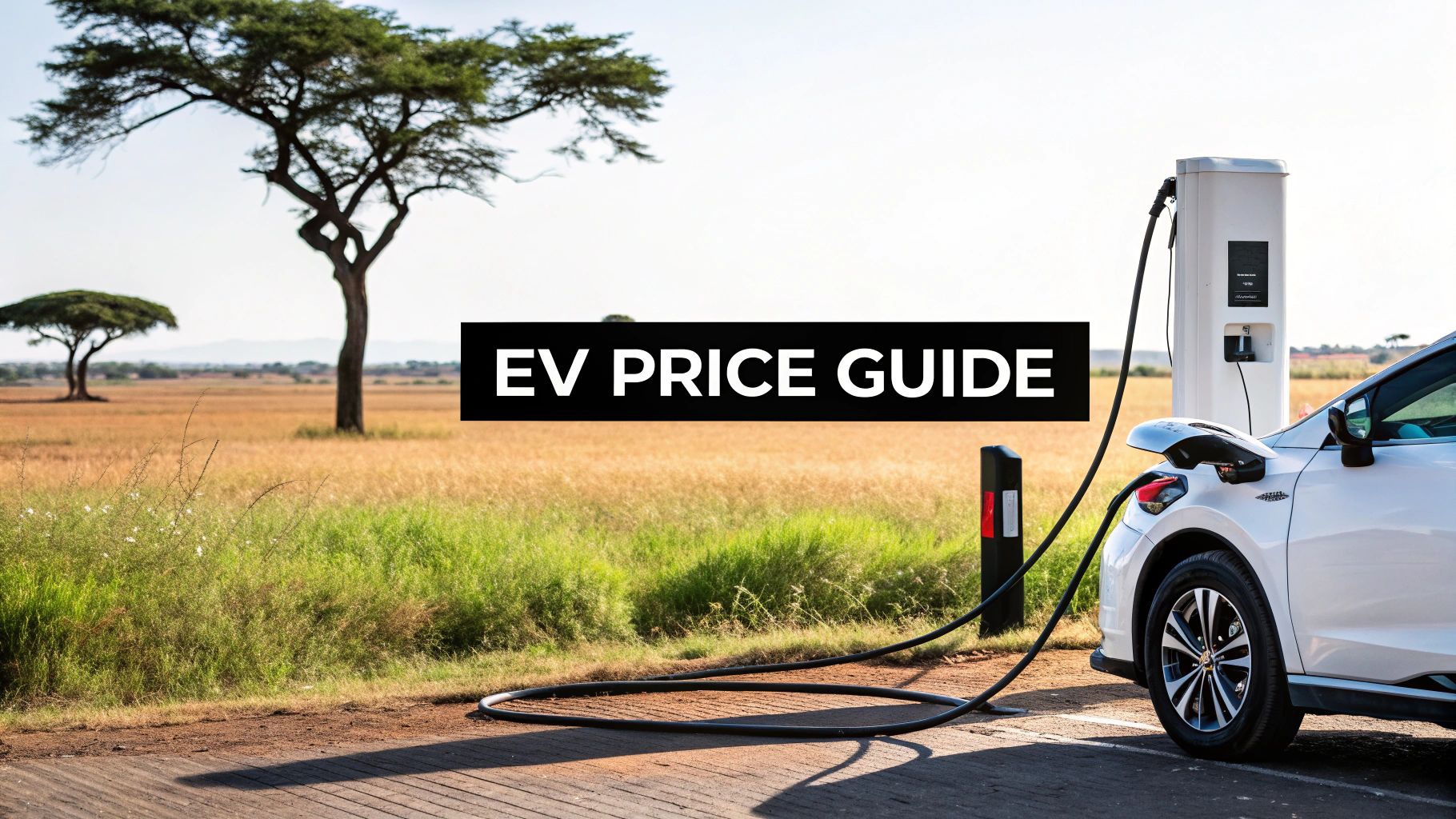
Right now, the starting price for an electric car in Botswana is hovering around P450,000 for a more basic model. For high-end, premium brands, you could be looking at well over P1,500,000. And that's before you even start talking about the hefty import duties and taxes.
Unlike many other places where governments offer a helping hand with subsidies, Botswana doesn't have direct financial incentives to bring that initial cost down. This sets up a unique situation: the upfront investment feels steep, but the long-term savings on fuel and maintenance are massive.
Decoding the True Cost of Electric Cars in Botswana Today
When you first look into buying an electric car in Botswana, you quickly see that the showroom price is just the beginning of the story. It's only one part of a much bigger financial picture. The local EV scene is definitely picking up steam, drawing in drivers who are tired of high fuel costs and want to reduce their environmental impact. But to really get a handle on the cost, you have to look past that initial price tag.
The financial side of buying an EV here is quite different from what you might expect. A huge chunk of what you end up paying has almost nothing to do with the car itself. We're talking about import duties, Value Added Tax (VAT), and shipping fees, all of which can seriously inflate the final cost. This is the main reason EVs seem so much more expensive upfront compared to a familiar petrol car.
What Shapes the Price Tag
A few key factors come together to determine what you'll actually pay for an EV. Getting your head around these is the first real step to making a smart buying decision.
- The Car's Base Price: This is the starting point set by the manufacturer. It's driven by the brand's reputation, the size of the battery (which dictates range), and all the tech packed inside.
- Import Duties and Taxes: Since there are no special tax breaks for EVs at the moment, they get hit with the standard customs duties and VAT. This adds a significant amount to the final bill.
- Shipping and Logistics: Getting the car into Botswana costs money. This fee can vary quite a bit depending on where the car is coming from.
- The Long-Term Win: This is where the story gets interesting. That higher initial price is often balanced out over time by huge savings. You're no longer buying petrol, and with no oil changes or complex engine servicing, maintenance costs drop dramatically.
Think of it like buying a top-of-the-line, energy-efficient fridge. The initial purchase might sting a bit more than a standard model, but you save money on your electricity bill month after month, year after year. An EV works the same way. The upfront cost is higher, but the continuous savings from ditching petrol are where you really come out ahead.
The real value of an electric car in Botswana isn't just in how it drives; it's in the total cost of ownership over its lifetime. That initial price is a hurdle, but the financial breathing room you get from fuel and maintenance savings is the real prize.
Throughout this guide, we're going to pull apart each of these costs. We'll get into the specific taxes you need to know about, show you price ranges for popular models, and help you figure out the true total cost of ownership. Once you understand all the pieces, you can decide with confidence whether an EV makes sense for your budget and your future.
What an Electric Car Really Costs in Botswana
When you start shopping for an electric car in Botswana, the price you see online or in a showroom is just the beginning of the story. Think of it as the price tag on the car itself, but not the final price you'll actually pay to get it on the road. To get a true picture, you have to peel back the layers and look at all the extra costs—mostly taxes and import fees—that get added on.
It’s a bit like buying a plane ticket. You see the base fare, but then you have to add taxes, airport fees, and baggage charges. By the time you check out, the total looks quite different. It's the same deal with EVs here. As of early 2025, there are no government incentives or tax breaks to soften the blow, so you're paying the full cost.
This image shows some of the popular models you might be considering. Each one has its own base price, which is the starting point for calculating your total outlay.
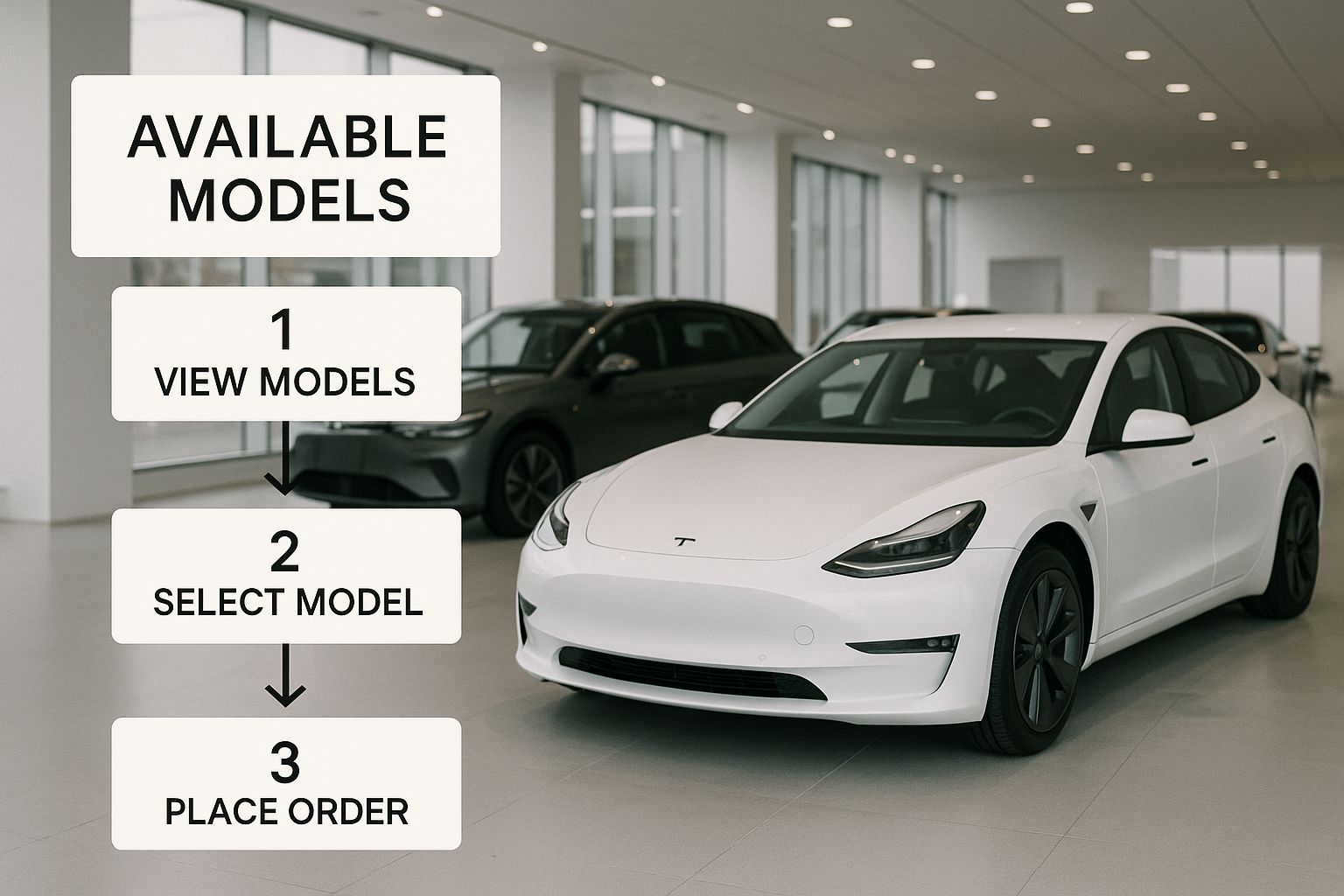
Whether it's a sleek saloon or a practical SUV, remember that the sticker price is just that—a sticker. The real work in budgeting starts now.
Breaking Down the Added Costs
So, where do all these extra costs come from? The big ones are import-related charges. Since virtually every EV in Botswana is imported, these fees are unavoidable and are the main reason the final price is so much higher than what the manufacturer originally asked for.
Let's run through a quick example to see how the numbers stack up. Imagine you've found an EV you love, and its landed cost (the price of the car plus shipping and insurance) is P500,000. Here’s how the fees would pile on:
- Customs Duty: First, you’ll pay a customs duty. Let's use a common rate of 15%. That immediately adds P75,000 to your bill.
- Training Levy: Next up is a smaller but compulsory 1% training levy. On our example car, that’s another P5,000.
- Value Added Tax (VAT): This is the big one. VAT is calculated on the new total—the base cost plus all the duties and levies. So, we add P500,000 + P75,000 + P5,000 to get a new taxable base of P580,000. At the current rate of 14%, VAT comes out to a hefty P81,200.
Suddenly, your P500,000 car now has a price tag of P661,200. And that’s before a few other smaller costs. For a complete look at these charges, our Botswana EV import guide covers the entire process and all the required fees in detail.
Other Overlooked Expenses
The list doesn't stop with taxes. There are a handful of other expenses that are easy to forget but are absolutely essential for budgeting correctly.
- Shipping & Logistics: Getting the car from its country of origin to Botswana isn't cheap. This can set you back anywhere from P20,000 to P50,000, sometimes even more, depending on where it’s coming from.
- Port & Clearing Fees: Once the car lands, you'll have to pay for handling at the port and hire a clearing agent to sort out the mountain of paperwork.
- Local Registration: Finally, to get your EV legally on the road, you'll need to pay for local registration, inspection, and of course, your new number plates.
The sticker price is just an invitation to a much larger financial conversation. Understanding every line item, from customs duty to registration, is the key to avoiding surprises and making a financially sound decision.
While the EV market here is definitely picking up, with cars like the Tesla Model 3 and BYD Atto 3 becoming more common sights, the prices are still a hurdle for many. Without any government subsidies to absorb some of the import duties, the buyer has to shoulder the full cost. This makes it absolutely critical to do your homework and understand the complete cost before you sign on the dotted line.
How Government Policy Shapes EV Affordability
When you’re trying to figure out the electric car price Botswana buyers face, government policy is one of the biggest, and most complicated, parts of the puzzle. Unlike other parts of the world where governments are handing out big discounts to get people into EVs, Botswana’s strategy is a bit more subtle. The focus here is less on immediate price cuts and more on building a long-term green economy.
This creates a bit of a push-and-pull situation for anyone looking to buy an electric car. You see positive signs that the country is moving towards clean energy. But at the same time, the most powerful tool for making EVs affordable—direct tax relief—is still missing from the toolbox.
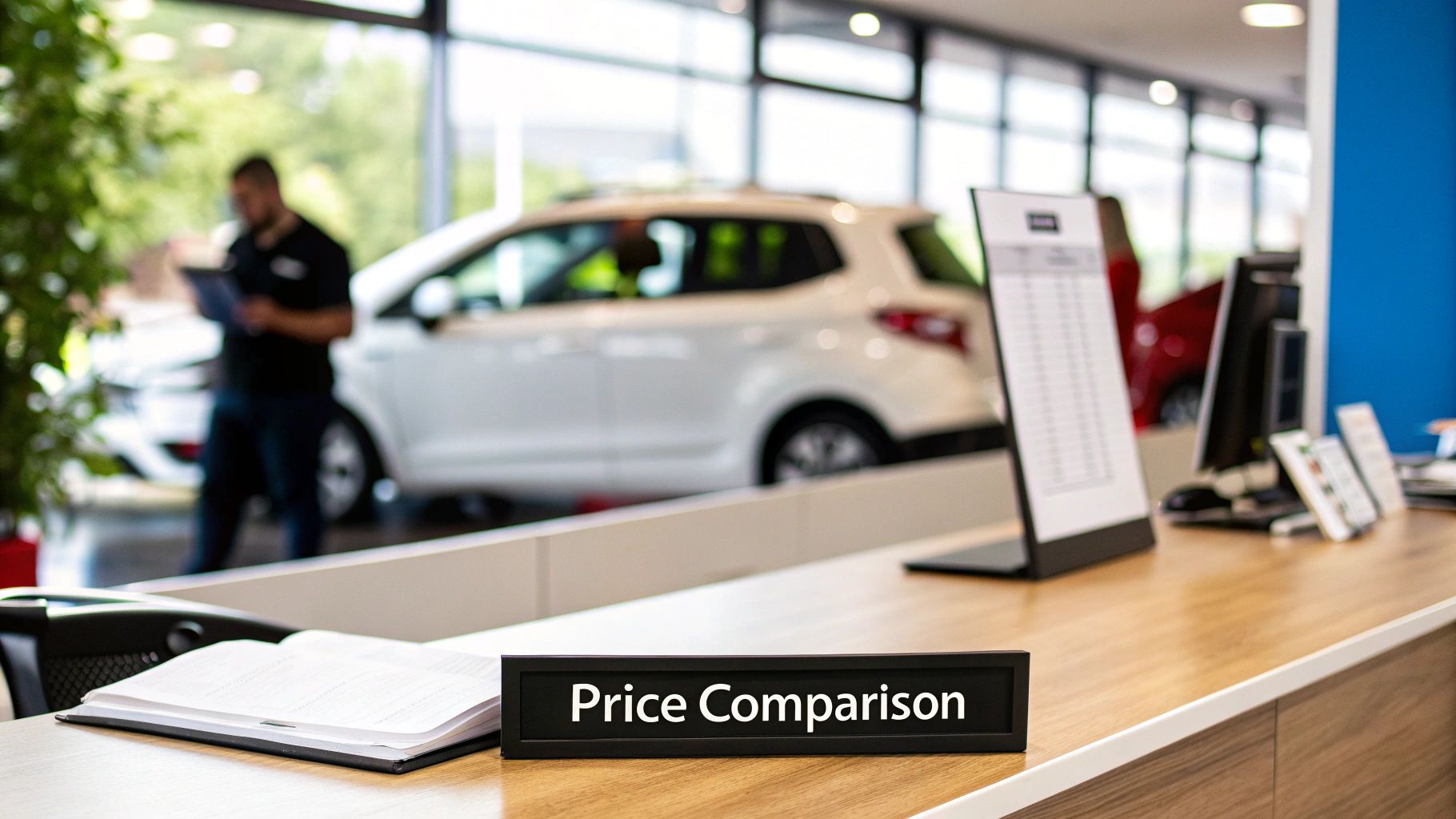
Indirect Support Versus Direct Incentives
The Botswana government is definitely taking steps to promote clean energy. A great example is the subsidies they’ve introduced to encourage people to get rid of older, high-emission petrol and diesel cars. While this isn’t an EV-only incentive, it gently nudges the market towards cleaner options like electric cars. It’s like clearing out the old to make room for the new.
This is where the direct help for the average car buyer seems to stop for now. If you look at what works around the globe, the most successful policies for getting more EVs on the road are direct financial perks. These usually come in a few flavours:
- Tax Rebates: A straightforward reduction in your tax bill for buying an EV.
- Point-of-Sale Discounts: The price is slashed right there at the dealership.
- Import Duty Exemptions: Removing the hefty taxes that jack up the price of imported vehicles.
Right now, Botswana doesn’t offer these kinds of direct benefits. So, while the government supports the idea of clean transport, buyers still have to pay the full price of import duties and VAT. As we’ve seen, this can easily add tens of thousands of Pula to the final electric car price in Botswana.
To get a better sense of this, you can read more about how how government policies are shaping EV adoption in Africa in our deep-dive article.
What About Scrappage Schemes?
Another tool governments use are scrappage schemes, which can also help make new cars—including EVs—more affordable. These programmes offer you cash for trading in an old, polluting car. While Botswana’s current subsidies are a step in that direction, learning about how scrappage schemes work in other countries shows just how much potential they have to speed up the shift to cleaner vehicles.
The current policy in Botswana is like building a strong foundation for a house but forgetting to install the front door. The support structure for clean energy is there, but the direct, easy entry point for most buyers—financial incentives—is still missing.
This gap in policy is a huge reason why the upfront cost of an EV is still a major hurdle for so many people. The long-term savings on fuel and maintenance are fantastic, but without some help to get over that initial price shock, the market can only grow so fast.
So, What's the Real Cost of Owning an EV?
The price you see on the windscreen is just the beginning of the story. To really get a handle on the electric car price Botswana drivers will face, you need to look at the bigger picture: the Total Cost of Ownership (TCO). This is where an EV, which might seem pricey at first, often proves to be a clever long-term financial move.
It’s a bit like choosing a lightbulb. You could buy a cheap, old-school incandescent bulb that costs next to nothing, but it guzzles electricity and needs replacing all the time. Or, you could invest a bit more in a modern LED bulb. It costs more upfront, but it slashes your electricity bill and lasts for years. The EV is your LED bulb – a bigger initial investment that pays you back month after month.
Fuel Savings: The Game Changer
The most significant and immediate saving you'll notice is waving goodbye to the petrol station. The cost of electricity to power an EV is a fraction of what it costs to fill a tank for the same distance. While petrol prices are always on a rollercoaster, electricity costs tend to be much more stable, which makes budgeting for your transport a whole lot easier.
Let's break it down. A standard petrol car could easily cost you over P1,000 for a full tank to get you about 600 km. To cover that same distance in an EV charged at home, you’d be looking at less than P250 in electricity. That difference adds up fast, saving you thousands of Pula every single year.
Curious about your specific situation? Try our electric car charging cost calculator to see exactly how much you could save compared to what you're spending on fuel now. It's a real eye-opener.
Cutting Down Your Maintenance Bills
Another huge win for EV owners is how little maintenance they need. An electric motor is a beautifully simple piece of engineering with very few moving parts. Compare that to an internal combustion engine (ICE), which is a complex puzzle of pistons, valves, belts, and fluids all working (and wearing out) together.
This simplicity means you can cross a whole list of regular garage visits and expenses off your to-do list:
- No More Oil Changes: Since EVs don't use engine oil, you'll never have to pay for an oil and filter change again.
- Forget Spark Plugs and Filters: There are no spark plugs, fuel filters, or engine air filters that need replacing.
- A Smarter Braking System: EVs use regenerative braking, where the motor helps slow the car down and sends energy back to the battery. This means your brake pads and discs do a lot less work and last much, much longer.
- No Exhaust System: Without an exhaust, you'll never have to worry about a rusty silencer or a faulty catalytic converter.
Owning an EV is a shift in mindset. You move from expecting frequent, costly maintenance to enjoying minimal, predictable check-ups. The money saved on parts and labour alone can dramatically lower your total cost of ownership in just a few years.
To put it all into perspective, let’s compare the potential annual running costs of an EV against a similar petrol car in Botswana.
EV vs. Petrol Car Annual Cost Comparison in Botswana
This table gives a rough estimate of what you might expect to spend over a year. Keep in mind that individual costs will vary based on your driving habits, the specific car models, and electricity versus petrol price fluctuations.
| Cost Factor | Electric Vehicle (EV) | Petrol Vehicle (ICE) | Notes |
|---|---|---|---|
| Fuel/Energy | ~P3,750 | ~P15,000 | Based on 15,000 km/year. EV costs assume home charging. |
| Maintenance | ~P800 | ~P3,500 | Includes tyres, wipers, but excludes oil changes, filters, and spark plugs for the EV. |
| Insurance | ~P5,000 | ~P5,000 | Costs are generally comparable, though this can vary by insurer and model. |
| Licensing/Fees | ~P400 | ~P400 | Annual vehicle license fees are similar for both vehicle types currently. |
| Total (Est.) | ~P9,950 | ~P23,900 | The EV shows a potential annual saving of over P13,000. |
As you can see, the running costs are where the EV really pulls ahead. Over the life of the car, these annual savings make the higher initial purchase price much more manageable.
The Bigger Picture in Botswana
The government has shown its interest by investing over 100 million Botswana Pula in electric vehicle initiatives, which is a positive sign. However, there's still a debate about whether cars are truly being manufactured locally or just assembled and rebranded from imported kits. This just goes to show that building a local EV industry from the ground up is a complex task, and for the foreseeable future, the market will likely depend on imported vehicles.
Even with these market-level challenges, the financial case for owning an EV as an individual is strong and getting stronger. When you add up the lower energy bills, minimal maintenance, and the potential for better resale value as they become more popular, the total cost of owning an EV in Botswana stacks up incredibly well against a traditional petrol car. It takes a bit of a forward-thinking perspective, but the numbers don't lie—it can be a very smart financial decision.
How to Purchase and Finance Your Electric Car
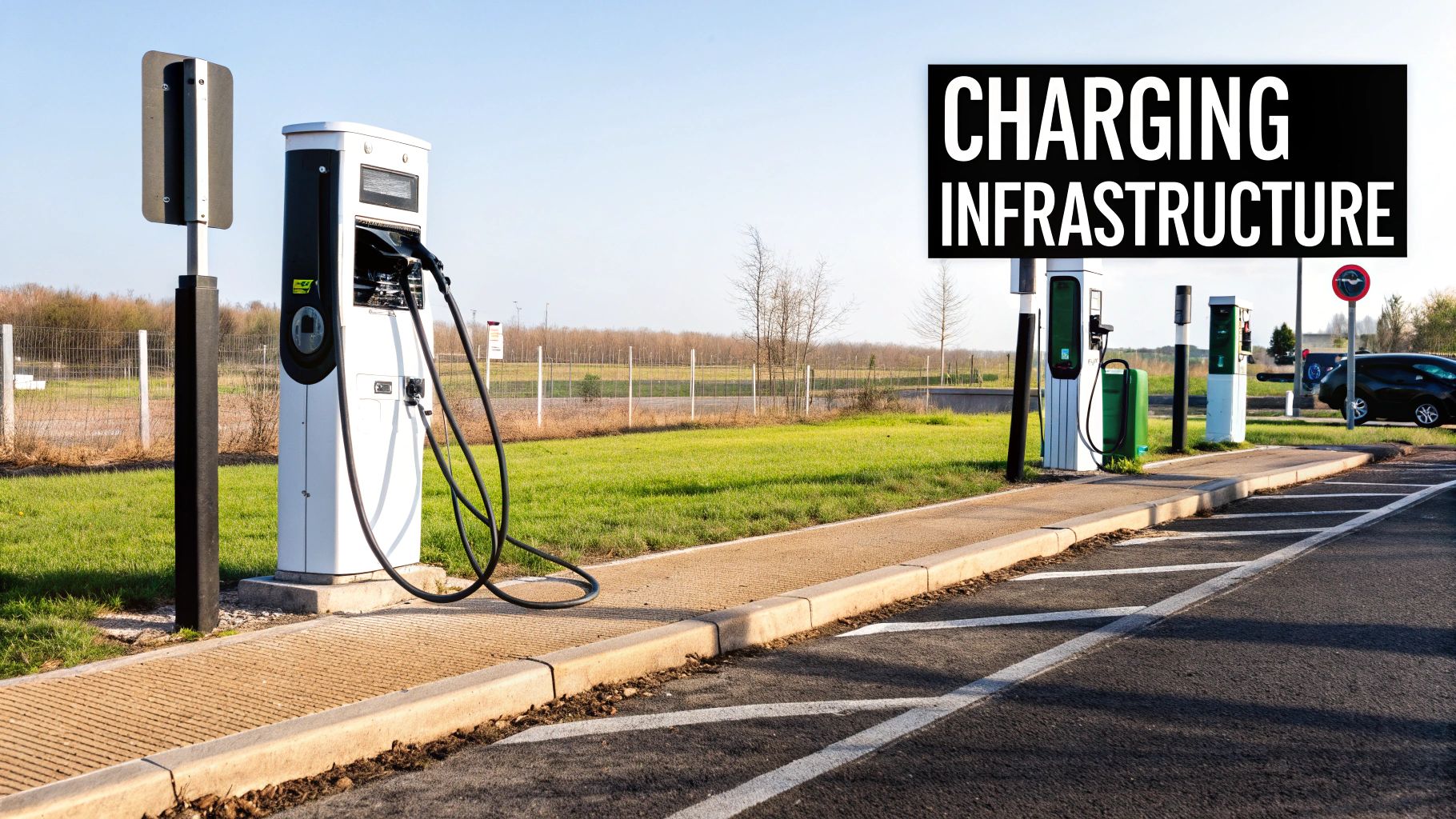
Alright, so you’ve got a handle on the costs. The next big step is figuring out how to actually buy and finance your EV. In Botswana, there are a few different ways to get your hands on an electric car, and each route comes with its own quirks when it comes to price, ease, and what happens after you drive off.
Essentially, you can go through a local dealership, use a dedicated online platform, or take on the challenge of importing the car yourself. The path you choose will have a real impact on the final electric car price Botswana residents end up paying and the kind of support you can expect down the road.
Your Main Purchasing Options
Deciding where to buy your EV is a big deal. Each option really caters to a different kind of buyer—some people want the convenience and reassurance of a local dealer, while others are laser-focused on finding a specific model or just getting the lowest possible price.
Let's break down your main choices:
- Local Dealerships: Going to a local dealer like Megatoss Motors is the classic, straightforward approach. You get to see the car in person, take it for a spin, and you have someone to call if things go wrong. This is usually your best bet for solid after-sales support and warranty, but your choice of models might be a bit limited.
- Specialised Online Platforms: Marketplaces such as EV24.africa have popped up to fill a gap, offering a much wider range of EVs from different brands. They handle almost everything for you—browsing, financing, and even the tricky import logistics—before delivering the car to your door. It’s a nice middle ground between variety and convenience.
- Direct Importation: This is the DIY route. It gives you ultimate control over what car you get and can sometimes save you a bit of money on the sticker price. The trade-off? You're on your own. You’ll have to manage all the shipping, customs paperwork, and taxes, which can be a real headache if you’re not prepared.
Securing Financing in Botswana
For most people, getting a loan is a crucial part of the process. The good news is that major banks in Botswana are warming up to EVs as they become more mainstream. To get ready, you’ll need to have your finances in good order.
Banks will typically ask for a down payment of around 10-20% of the car’s total cost. Most loan terms run for three to six years, and the interest rate will depend on your credit history and the bank's own lending policies.
When you're ready to apply for financing, make sure you have everything organised. You'll need proof of a steady income, a decent credit score, and all the details of the car you want to buy. A well-prepared application makes a huge difference in getting approved with good terms.
Your Top Questions About EV Prices Answered
Stepping into the world of electric vehicles is exciting, but it naturally comes with a lot of questions—especially around the price tag. Let's tackle some of the most common queries we hear from buyers in Botswana to help clear things up.
Are There Any Government Subsidies to Help with the Cost?
This is probably the most frequent question we get. People want to know if there's any government help to make EVs more affordable.
Right now, the answer is no. Botswana doesn't have any direct government subsidies, tax credits, or special import duty exemptions for buying a new electric vehicle. While the country is making moves towards clean energy, this hasn't yet translated into a direct discount for EV buyers at the dealership. So, the price you see will include the full import duties and VAT.
Could I Save Money by Importing an EV Myself?
It’s tempting to think you can cut out the middleman and get a better deal.
While importing an EV on your own might look cheaper at first glance, you’re also taking on all the headaches. This means managing the international shipping, navigating customs clearance, and handling all the tax payments yourself, which can be a tricky and drawn-out process.
Buying from a local dealer or a specialised platform like ours rolls all those costs into a clear final price. More importantly, it gives you a warranty, after-sales service, and genuine peace of mind. For most people, that security is well worth it.
How Do the Running Costs Really Compare to a Petrol Car?
Everyone talks about the long-term savings, but what does that actually look like?
This is where EVs truly shine. The cost of charging your car with electricity at home is dramatically lower than what you’d spend on petrol to travel the same distance. It's a game-changer for your monthly budget.
On top of that, EVs have far fewer moving parts, which means less maintenance. You can forget about paying for things like:
- Oil changes
- Spark plug replacements
- Exhaust system repairs
When you add it all up, these savings can eventually cover a huge chunk of the initial purchase price, making the total cost of owning an EV incredibly appealing over the long run.
What's the Single Biggest Thing Driving Up the Final Price?
If you're trying to budget, it helps to know where the biggest chunk of the cost comes from.
Without a doubt, the single biggest factor pushing up the final electric car price in Botswana is import duties and taxes. Because EVs don't get any special treatment, they're hit with the same customs duties and VAT as any regular petrol or diesel car. These taxes are calculated on the vehicle's total value once it lands in the country, adding a hefty amount to the sticker price.
Ready to see a range of electric vehicles with clear, upfront pricing, and skip the import hassle? Head over to EV24.africa to browse models available now and find the perfect EV for you, complete with full support for delivery and financing. Find your next car at https://ev24.africa.


